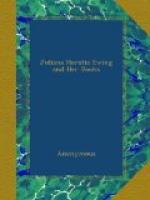[Footnote 1: Reprinted in “A Great Emergency and other Tales.”]
The same friend is now a bishop in another hemisphere from ours, but he will ever be reckoned a “great” friend. Our bonds of friendship were tied during hours of sorrow in the house of mourning, and such as these are not broken by after-divisions of space and time. Mrs. Ewing named him “Jachin,” from one of the pillars of the Temple, on account of his being a pillar of strength at that time to us. Let me now quote the opening description of Madam Liberality from the story:—
It was not her real name; it was given to her by her brothers and sisters. People with very marked qualities of character do sometimes get such distinctive titles to rectify the indefiniteness of those they inherit and those they receive in baptism. The ruling peculiarity of a character is apt to show itself early in life, and it showed itself in Madam Liberality when she was a little child.
Plum-cakes were not plentiful in her home when Madam Liberality was young, and, such as there were, were of the “wholesome” kind—plenty of breadstuff, and the currants and raisins at a respectful distance from each other. But, few as the plums were, she seldom ate them. She picked them out very carefully, and put them into a box, which was hidden under her pinafore.
When we grown-up people were children, and plum-cake and plum-pudding tasted very much nicer than they do now, we also picked out the plums. Some of us ate them at once, and had then to toil slowly through the cake or pudding, and some valiantly dispatched the plainer portion of the feast at the beginning, and kept the plums to sweeten the end. Sooner or later we ate them ourselves, but Madam Liberality kept her plums for other people.
When the vulgar meal was over—that commonplace refreshment ordained and superintended by the elders of the household—Madame Liberality would withdraw into a corner, from which she issued notes of invitation to all the dolls. They were “fancy written” on curl-papers, and folded into cocked hats.
Then began the real feast. The dolls came and the children with them. Madam Liberality had no toy tea-sets or dinner-sets, but there were acorn-cups filled to the brim, and the water tasted deliciously, though it came out of the ewer in the night-nursery, and had not even been filtered. And before every doll was a flat oyster-shell covered with a round oyster-shell, a complete set of complete pairs which had been collected by degrees, like old family plate. And, when the upper shell was raised, on every dish lay a plum. It was then that Madam Liberality got her sweetness out of the cake. She was in her glory at the head of the inverted tea-chest, and if the raisins would not go round the empty oyster-shell was hers, and nothing offended her more than to have this noticed. That was her spirit, then and always.




